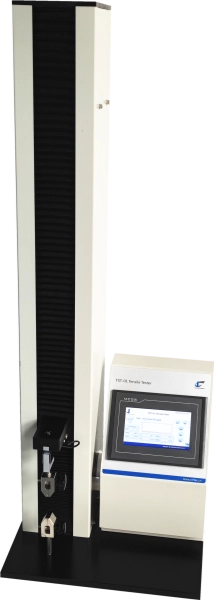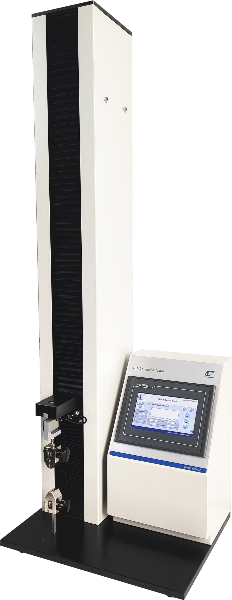Tensile&Elongation&ASTM D882
Elongation Testing for Plastic Film
About Us
Tensile and Elongation
In the field of material quality control—especially for flexible films, plastic sheets, adhesives, and medical packaging—tensile and elongation properties are critical performance indicators. Evaluating how materials react under tensile force not only ensures product reliability but also guides material selection and manufacturing quality.
Tensile strength refers to the maximum stress a material can withstand while being stretched before breaking. Elongation, often expressed as a percentage, measures how much a material can be stretched before it fractures.
In practical applications, these properties directly affect the performance of packaging films, medical device barriers, plastic containers, and sealing films. High tensile strength ensures durability, while sufficient elongation indicates flexibility and resistance to sudden failure. Therefore, tensile and elongation testing is indispensable in quality control and material development.

Testing Standards for Tensile and Elongation
- ASTM D882
To ensure accuracy and consistency, industry professionals commonly refer to ASTM D882—the Standard Test Method for Tensile Properties of Thin Plastic Sheeting. This standard outlines precise testing conditions for materials with thicknesses typically less than 1 mm.
Key provisions of ASTM D882 include:
01
Specimen dimensions
Strip width of 5 to 25.4 mm, uniform thickness
02
Gauge length
Typically 250 mm for modulus calculations
03
Test speed
Adjusted based on gauge length and elongation behavior
04
Measurement outputs
Tensile strength, percent elongation at break, yield, and modulus of elasticity
ASTM D882 provides the methodological backbone for elongation tensile test and tensile strength and elongation test evaluations in R&D and production settings.
Definition of Elongation Test
What Is Elongation Testing?
Tensile testing determines how a material behaves under axial pulling forces. A specimen is clamped into a testing machine, which applies controlled tension until the material fractures. Key metrics measured include:
- Tensile Strength: The maximum stress a material can withstand before breaking.
- Yield Strength: The stress at which permanent deformation occurs.
- Elongation: The percentage increase in length before fracture.
These parameters help engineers select materials for specific applications, such as flexible packaging or durable medical devices.
Elongation in Material Testing
Elongation quantifies a material’s ability to stretch without breaking. It is calculated as:
Elongation (%)=(Final Length – Initial Length)/Initial Length ×100
High elongation indicates flexibility, making materials suitable for products like stretchable films or elastic textiles. Conversely, low elongation materials, such as rigid plastics, are preferred for structural components.
Conducting a Tensile Strength and Elongation Test
How a Tensile and Elongation Test Is Performed
1. Specimen Preparation
Samples are prepared according to ASTM D882 specifications. This involves:
· Cutting samples with uniform width and thickness
· Avoiding nicks or edge imperfections
· Ensuring specimens are longer than the grip separation
2. Test Setup
· Specimen is mounted between grips with its long axis aligned
· Initial gauge length is set (typically 250 mm)
· Load cell and displacement sensors are calibrated
3. Running the Test
· Machine applies uniaxial tensile force at controlled speed
· Force vs. elongation data is recorded continuously
· Test continues until rupture or elongation limits are reached
4. Data Analysis
· Tensile strength: Maximum force divided by original cross-sectional area
· Elongation at break: Extension at rupture divided by initial gauge length, multiplied by 100
· Modulus: Slope of the linear portion of the stress-strain curve
Performing a tensile and elongation test:
- Verifies material consistency and batch reliability
- Helps in detecting defects such as weak seal areas or brittleness
- Supports R&D in developing more robust and flexible materials
- Ensures compliance with ASTM D882 and customer quality expectations
Why Tensile and Elongation Testing Matters
When combined with high-performance instruments like Cell Instruments' TST-01, these tests empower engineers and quality teams with actionable data for better decision-making.
Applications Across Industries
Seal strength, film toughness, tear resistance.
– Packaging
Tube burst pressure prediction, suture strength, film integrity for sterile barriers.
– Medical Devices
Fabric strength, elastic recovery, seam performance.
– Textiles
Material characterization, quality control, comparative analysis of grades.
– Plastics & Polymers
Bond strength, cohesive strength.
– Adhesives
Bursting strength correlation, handling durability.
– Paper & Board
Choosing the Right Tensile and Elongation Testing Machine
Equipment Used: Elongation Testing Machine
Choosing the right tensile and elongation testing machine is crucial for accurate results. A standard system typically includes:
- Precision grip fixtures
- Motorized control for test speed and displacement
- Real-time force and elongation measurement systems
- Data acquisition and software for analysis
Advanced systems like the Cell Instruments TST-01 enhance test repeatability and user experience.

Features of TST-01 Tensile and Elongation Testing Machine
The TST-01 from Cell Instruments is an industry-leading elongation testing machine designed specifically for flexible packaging, plastic films, adhesives, and other materials requiring accurate tensile evaluation.
Key Advantages:
- PLC-controlled precision ensures highly consistent test execution.
- 7-inch HMI touchscreen provides a user-friendly interface.
- Variable speed control (1–500 mm/min) meets a wide range of test requirements.
- Displacement accuracy of 0.01 mm for fine elongation measurements.
- Customizable grips and stroke lengths accommodate various materials and test methods.
- Optional RS232 and microprinter options support data traceability and digital archiving.
Thanks to these features, the TST-01 excels in performing tensile test elongation, elongation tensile test, and comprehensive tensile strength and elongation test procedures in compliance with ASTM D882.
Tensile and elongation is fundamental for professionals working with plastic sheeting, films, medical packaging, and adhesives. With increasing quality expectations across industries, relying on standardized testing methods and precision instruments is essential.
– Elongation Test
FAQs
1. What is the difference between tensile strength and elongation?
Tensile strength measures the maximum force a material can withstand before breaking. Elongation measures how much the material stretches before it breaks, usually expressed as a percentage.
2. What materials are suitable for tensile and elongation testing?
Materials like plastic films, thin sheets, laminates, textiles, and adhesives are commonly tested, particularly when used in packaging and medical applications.
3. What standard governs elongation and tensile tests for plastic films?
The most commonly used standard is ASTM D882, which provides comprehensive guidelines for specimen preparation, testing parameters, and data interpretation.
4. Why choose the Cell Instruments TST-01 for elongation tensile testing?
The TST-01 offers high precision, flexible test speeds, customizable fixtures, and an easy-to-use interface—ideal for a wide range of materials and compliance with ASTM standards.
5. What data does the elongation tensile test provide?
The test provides values such as tensile strength, percent elongation at break, modulus of elasticity, and potentially tensile energy to break, depending on the application.


Get in touch
No. 5577 Gongyebei Rd, Licheng, Jinan, 250109, Shandong, P.R.C.
marketing@celtec.cn
+86 185 6001 3985
